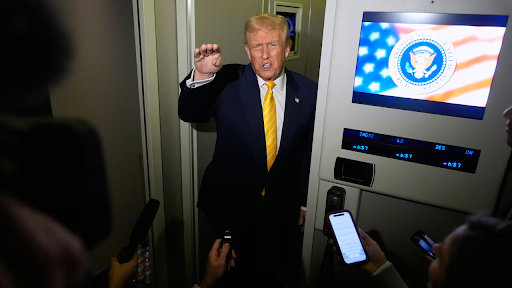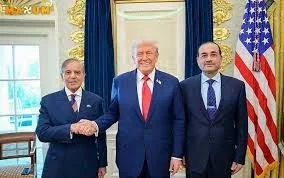If the leader of the United States of America and his representatives can justify the level of misogyny and disrespect in his interactions with female members of the press as simply “frank and honest,” there is a long road ahead of us for reaching equal treatment between genders in the modern political sphere.
Read MoreInto that vacuum—where meaningful opposition should exist but doesn’t—steps Kamala Harris, not with leadership or strategy on how to defeat Trumpism and the increasingly right-wing establishment, but to hawk her new memoir, 107 Days. The memoir epitomizes exactly what has gone wrong for Democrats; it is a complete failure without address, the product of a party that can no longer articulate a single material solution for the people it claims to represent.
Read MoreDiplomacy is known by some as simply the art of getting what you want. Pakistan has demonstrated mastery of this art by leveraging recent geopolitical developments in South Asia to reimagine, reconstruct, and bolster a once-strained relationship with the United States.
Read MoreAbigail Spanberger (D) is decisively elected Governor of Virginia, carrying key votes from the Latino electorate. This article analyses the reasons for this change and the impact it may have on future elections.
Read MoreThe Trump administration’s defense of “free speech” rings hollow when paired with its own efforts to silence opposing voices, proving that what it truly seeks is not freedom of expression, but control over who gets to speak. So, let’s talk about censorship.
Read MoreMaduro inherited an unstable, corrupt government that was solely based on the sheer charisma of his predecessor—despite his dictatorial tendencies. However, instead of enacting policies to counter the impending downfall of his government, Maduro doubled down on Chávez’s decisions. He knew that his support stemmed from the blessing of the late president and the unfaltering chavistas, and he has continued to establish an authoritarian state in Venezuela
Read MoreMikie Sherrill’s victory was part of a sweep by Democrats this November. From Democratic socialist Zohran Mamdani to moderate Abigail Spanberger, Democrats across the political spectrum won with Sherill’s Navy background, high voter turnout, and an anti-Trump platform, which led to her victory.
Read MoreWhat is happening in North Carolina is part of a larger, and deeply concerning, proliferation of mid-decade redistricting for political gain. The recent push for redrawing district boundaries in between census cycles is clearly a political move designed to tip the balance of power in Congress towards one party. Politicians on both sides of the aisle must strive for the pursuit of fair districts together
Read MoreIn the wake of the pandemic, a new debate has taken hold within the Democratic Party, one that questions whether America’s future lies in building more or regulating less. As journalists Ezra Klein and Derek Thompson argue in their 2025 book Abundance, the nation’s greatest obstacles are soaring housing costs and aging infrastructure, which stem not from scarcity of funds but from an excess of regulation. Yet, while the call to build more promises a sense of renewal, it also revives past projects that displaced communities. The Abundance movement has thus split the Democrats, prompting the question: Can America construct its future without losing sight of the moral underpinnings of progress?
Read MoreBy honoring disgraced figures like Albert Pike while silencing the stories of historically marginalized groups, Trump intends to alter the story of the United States into a nation that is based on nostalgia for a glamorized past, rather than accountability. The administration’s campaign to “restore truth and sanity” risks normalizing an idealized version of history that completely erases the oppression of marginalized groups and distorts the legacy of those who fought for freedom and equality for all Americans.
Read MoreOn November 7th, the Supreme Court will privately decide whether to hear the appeal of former Kentucky County Clerk Kim Davis, who refused to issue marriage licenses to same-sex couples in 2015 after the Court’s landmark decision in Obergefell v. Hodges. But after nearly a decade of Obergefell, the Court’s consideration of Davis’ case threatens to reopen a battle that many Americans had already considered resolved. Revisiting or weakening Obergefell would not only destabilize the progress America has made but also erode the very principle of equal justice under the law.
Read MoreThe crisis in South Sudan requires more than sympathy. It demands holding those who profit from conflict accountable, pressuring governments that allow hunger to persist, and protecting displaced populations.
Read MoreThe deployment of troops to Chicago is not simply about immigration or crime. It is about whether a president can deploy military force domestically, not for public safety, but to punish political opposition and shape a narrative. Once those limits are broken, they are rarely restored.
Read MoreThe party’s theme is too on the nose to be accidental—and if anyone in the world should have a top-tier public relations team, it’s the leader of the free world. Trump’s timing feels both poorly judged and deliberate, especially as millions of America’s most vulnerable scramble to make sense of where their next meal might come from
Read MoreThe Make America Great Again (MAGA) movement is nearing its ten-year anniversary since it redefined American politics, fueled by Trump’s populist rhetoric since his first presidential campaign in 2016. In response to Trump’s exit from the presidency, what path around MAGA will the Democratic Party chart for itself?
Read MoreInternational cooperation is a must to avoid a nuclear-arms-esque race to the bottom of AI regulations, or an “AI Non-Proliferation Treaty,” if you will. History has shown that whenever a technological advancement has the potential to cause harm, it often does. Recognizing the veritable downsides of AI can help the world get ahead of the eight-ball, maximize the merits of innovation, and mitigate the perils.
Read MoreForeign aid remains a lifeline for many countries in the Global South that rely on external help to cover basic human needs such as clean water, food, and healthcare, that are often subject to violent conflict. But despite its imperfections, foreign aid remains one of humanity’s most meaningful collective actions against the ills in the world.
Read MoreOn September 30th, President Trump and Defense Secretary Pete Hegseth made a sudden and politically charged address to hundreds of U.S generals and admirals who were summoned to Virginia at the Marine Corps Base, Quantico. The President and Defense Secretary took the opportunity to press their views upon the military’s finest, calling for the destruction of “woke” ideology within the barracks, ending “decades of decay”, and even eliminating “fat troops” from the forces…. This bombastic address from the Trump Administration certainly has consequences, unintended or not, because President Trump is not following tradition. Such action raises eyebrows regarding the line between military professionalism and civil politics…
Read MoreOn Tuesday night, Zohran Mamdani made history as New York City’s first Muslim Mayor. Over the past year, the 34-year-old self-proclaimed democratic socialist has taken the city’s mayoral race by storm, making it abundantly clear throughout his campaign that he’s planning to fight for the economic prosperity of the working and middle class. Mamdani’s anti-elitist agenda sparked rare bipartisan efforts to contain his rise–showing how powerful this win is. Mamdani’s New York City victory signals what’s ahead for America and the Democratic Party: a future increasingly shaped by socialism.
Read MoreWith America in its most intense era of partisan opposition, a government shutdown has prevented important government tasks from being completed. Furthermore, the shutdown is being used as a tool for the advancement of political agendas, with debates over the Epstein files and the swearing-in of House Representative Elect Adelita Grijalva (D-AZ) continuing to arise, despite the budget being the most dire issue at this time.
Read More



















